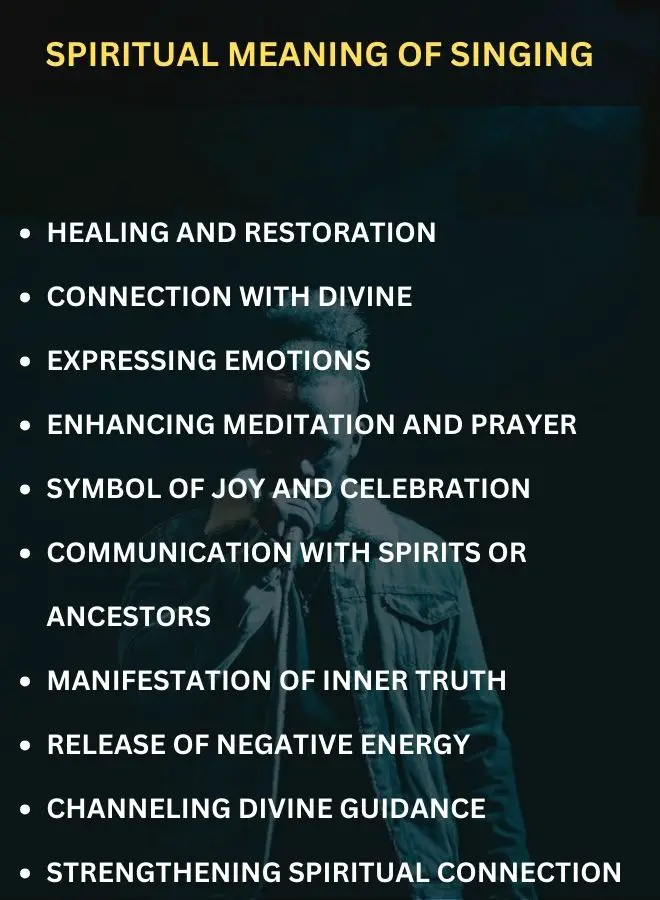Singing holds profound spiritual significance, encompassing healing, connection with the divine, emotional expression, and cultural traditions, enriching lives worldwide.
Singing is more than just a melody; it’s a pathway to the soul, a conduit for spiritual connection, and a language of the divine. In this article, we’ll delve into the rich tapestry of singing symbolism, exploring its myriad spiritual meanings across cultures and traditions.
From healing and transcendence to worship and revelation, singing holds the power to elevate our spirits and awaken our innermost truths.
Spiritual Meaning of Singing

Singing as Healing and Restoration
Singing has long been recognized as a potent tool for healing and restoration. Whether belting out a heartfelt ballad or chanting ancient mantras, the act of vocal expression can soothe the soul, mend emotional wounds, and alleviate physical ailments.
Through the vibrational energy of sound, singing clears stagnant energies, promoting balance and harmony within the body, mind, and spirit.
Connection with the Divine
At its core, singing is a form of communion with the divine. In moments of worship, prayer, or meditation, our voices become vessels for transcendent grace, bridging the gap between the earthly and the ethereal.
Whether through hymns, chants, or spontaneous melodies, singing allows us to express our reverence, gratitude, and longing for a higher power, cultivating a deeper sense of spiritual intimacy and belonging.
Expressing Emotions
From jubilant anthems to melancholic ballads, singing serves as a cathartic outlet for our emotions. Through the power of song, we can articulate feelings of love, sorrow, anger, or hope with a depth and nuance that words alone cannot convey.
Whether singing alone in the shower or joining voices in a communal chorus, the act of vocal expression fosters emotional authenticity, fostering greater self-awareness and empathy.
Enhancing Meditation and Prayer
In the realm of meditation and prayer, singing acts as a potent catalyst for spiritual transcendence. Through repetitive mantras, sacred chants, or devotional hymns, we can quiet the restless chatter of the mind, enter into a state of deep presence, and attune ourselves to the divine frequencies of the universe.
In this sacred space of sonic resonance, we can commune with the innermost chambers of our soul, receiving guidance, insight, and inspiration.
Symbol of Joy and Celebration
From ancient tribal rituals to modern-day festivities, singing has been a universal symbol of joy and celebration. Whether in times of triumph, harvest, or communal gathering, our voices unite in harmonious chorus, expressing gratitude for life’s blessings and affirming our shared humanity.
Through the rhythm and melody of song, we celebrate the beauty of existence, infusing our hearts with a sense of exuberance, vitality, and interconnectedness.
Communication with Spirits or Ancestors
In many indigenous cultures, singing serves as a sacred channel for communication with spirits or ancestors. Through ceremonial chants, shamanic incantations, or ancestral hymns, we honor the wisdom and guidance of those who have come before us, invoking their presence and blessings.
In this sacred dialogue between the living and the departed, singing becomes a bridge between worlds, a conduit for ancestral memory, healing, and guidance.
Manifestation of Inner Truth
In moments of creative expression, singing becomes a powerful vehicle for the manifestation of inner truth. Whether through improvised melodies, soulful ballads, or poetic lyrics, we can articulate the depths of our soul, expressing our deepest longings, fears, and aspirations with raw authenticity and vulnerability.
Through the alchemy of song, we give voice to the ineffable mysteries of existence, bearing witness to the beauty and complexity of the human experience.
Release of Negative Energy
In times of emotional turmoil or spiritual stagnation, singing offers a release valve for pent-up negative energy. Whether through primal screams, guttural wails, or spirited chants, we can purge ourselves of toxic emotions, clearing the energetic pathways for renewed vitality and growth.
In the transformative fire of vocal expression, we transmute our pain into power, reclaiming our sovereignty and resilience.
Channeling Divine Guidance
Through the practice of devotional singing or sacred improvisation, we can open ourselves to receiving divine guidance and inspiration. In moments of surrender and receptivity, our voices become conduits for higher wisdom, channeling insights, revelations, and prophetic utterances from the realms beyond.
Whether through whispered prayers or ecstatic outpourings, singing invites us to trust in the unseen currents of grace, guiding us along the path of divine unfoldment.
Strengthening Spiritual Connection
Ultimately, singing serves as a bridge between the earthly and the divine, strengthening our spiritual connection and deepening our sense of reverence for the sacred mysteries of life. Whether through traditional hymns, mystical chants, or spontaneous improvisations, our voices carry the eternal song of creation, echoing the primordial longing for union with the divine.
In the timeless symphony of existence, singing invites us to participate fully in the dance of creation, celebrating our interconnectedness with all beings and the infinite expanse of the cosmos.
Variations and Spiritual Meanings of Singing
Chanting and Mantras
Chanting and mantras have been used for centuries as a means of focusing the mind and invoking divine presence. Whether reciting sacred syllables or repetitive phrases, chanting acts as a powerful tool for concentration, meditation, and spiritual transformation.
In the Hindu tradition, mantras are believed to carry potent vibrational frequencies, capable of awakening dormant energies, purifying the mind, and attuning the practitioner to the cosmic rhythms of the universe.
Tribal and Shamanic Singing
Tribal and shamanic singing are deeply rooted in the indigenous cultures of the world, serving as a conduit for healing, ritual, and communion with nature spirits. Through rhythmic drumming, trance-inducing chants, and ecstatic dance, shamans and tribal elders facilitate states of altered consciousness, journeying between the realms of the seen and the unseen.
In these sacred ceremonies, singing becomes a language of the soul, transmitting ancestral wisdom, healing energies, and spiritual guidance.
Gospel and Spirituals
In the African-American tradition, gospel music and spirituals are expressions of faith, resilience, and hope in the face of adversity. Rooted in the experience of slavery and oppression, these soul-stirring melodies uplift the spirit, affirming the power of redemption, liberation, and divine grace.
Through call-and-response refrains, fervent testimonies, and jubilant praise, gospel singing becomes a communal celebration of faith, uniting believers in a shared journey of spiritual transformation and liberation.
Sufi Whirling and Chants
In the mystical tradition of Sufism, whirling and chanting are practices of ecstatic devotion and union with the divine. Through the rhythmic rotation of the body and the repetition of sacred phrases, Sufi dervishes enter into a trance-like state of communion with the Beloved, transcending the limitations of the ego and merging with the cosmic dance of creation.
In the swirling vortex of divine love, singing becomes a sublime expression of longing, surrender, and divine union.
Gregorian Chants
Gregorian chants, rooted in the medieval monastic tradition, are expressions of reverence, contemplation, and devotion. Through their timeless melodies and sacred harmonies, Gregorian chants create a sacred space for prayer, meditation, and contemplative reflection.
In the hushed confines of the monastery, singing becomes a vehicle for communion with the divine, attuning the soul to the eternal rhythms of the cosmos and the ineffable mysteries of the divine.
Biblical Meanings of Singing

Songs of Praise and Lamentation
In the Hebrew Scriptures, the Psalms are a collection of sacred songs and prayers, expressing a range of emotions from joy and gratitude to sorrow and lamentation.
Through their poetic imagery and heartfelt expressions, the Psalms invite us into a deep and intimate relationship with the divine, affirming the faithfulness of God in times of trial and tribulation.
Worship and Thanksgiving in the New Testament
In the New Testament, singing is celebrated as a form of worship and thanksgiving to God. Whether through hymns, spiritual songs, or spontaneous melodies, believers are exhorted to offer their voices as a living sacrifice, glorifying God and edifying one another in the bond of love.
Davidic Tradition: Singing to Soothe Troubled Souls
In the tradition of King David, singing is portrayed as a means of soothing troubled souls and invoking divine favor. Through his psalms of lament and praise, David expresses the full range of human emotions, from despair and anguish to trust and confidence in God’s unfailing love.
Spiritual Warfare: Singing as a Weapon against Darkness
In the spiritual warfare of the Christian faith, singing is wielded as a powerful weapon against the forces of darkness. Through the exalted praises of God’s people, demonic strongholds are broken, captives are set free, and victory is proclaimed over every foe.
Prophecy and Revelation through Song
In the prophetic tradition, singing becomes a vehicle for divine revelation and spiritual insight. Whether through spontaneous songs of the Spirit or inspired compositions of the heart, prophets and seers channel the voice of God, declaring His purposes and proclaiming His kingdom come.
Hinduism Meanings of Singing
Bhakti Yoga: Devotional Singing and Divine Union
In the Hindu tradition, bhakti yoga is the path of devotional love and surrender to the divine. Through the practice of kirtan, bhajans, and devotional songs, devotees cultivate a deep and intimate relationship with the divine, merging their individual consciousness with the universal consciousness of God.
Kirtan: Chanting for Spiritual Transformation
Kirtan, or call-and-response chanting, is a central practice in the Bhakti tradition, inviting participants into a state of ecstatic devotion and spiritual transformation. Through the repetition of sacred names and mantras, kirtan awakens the dormant energies of the heart, purifying the mind and uplifting the spirit.
Carnatic and Hindustani Classical Music: Pathway to Enlightenment
In the classical music traditions of India, singing is revered as a pathway to enlightenment and self-realization. Through the rigorous training of the voice and the mastery of ragas, talas, and bhavas, musicians attain a state of deep concentration and transcendence, merging their individual consciousness with the cosmic rhythms of the universe.
Spiritual Significance of Ragas and Bhavas in Singing
Ragas, or melodic modes, and bhavas, or emotional expressions, play a central role in classical singing, evoking specific moods and states of consciousness.
Whether through the plaintive strains of a raga or the ecstatic crescendo of a bhava, singers immerse themselves in the divine currents of rasa, or aesthetic bliss, experiencing union with the divine through the beauty of sound.
Mantra Chanting: Awakening Inner Divinity
In the practice of mantra chanting, devotees invoke the divine presence through the repetition of sacred syllables or phrases.
Whether through the rhythmic recitation of Om, the cosmic sound of creation, or the divine names of gods and goddesses, mantra chanting purifies the mind, awakens the inner divinity, and attunes the practitioner to the cosmic vibrations of the universe.
Cultural Significance of Singing
Indigenous Traditions and Rituals
In indigenous cultures around the world, singing is an integral part of ritual, ceremony, and communal life. Whether through tribal chants, shamanic incantations, or sacred dances, indigenous peoples use singing as a means of honoring the earth, connecting with the ancestors, and maintaining harmony with the natural world.
Folk Music and Oral Traditions
In folk music traditions, singing serves as a repository of cultural heritage, transmitting stories, values, and traditions from one generation to the next. Whether through ballads, lullabies, or work songs, folk singers preserve the collective memory of their communities, celebrating the joys and sorrows of life with heartfelt melodies and soulful expressions.
National Anthems and Identity
National anthems are expressions of patriotism, pride, and collective identity, uniting citizens in a shared sense of belonging and allegiance to their country. Whether through stirring melodies or poignant lyrics, national anthems evoke a sense of reverence for the ideals and aspirations of the nation, inspiring loyalty and devotion in its citizens.
Role of Singing in Religious Ceremonies
In religious ceremonies and festivals, singing plays a central role in worship, celebration, and communal bonding. Whether through hymns, prayers, or sacred chants, believers express their reverence for the divine, affirm their faith, and cultivate a sense of spiritual fellowship with one another.
Influence of Singing in Social Movements
Throughout history, singing has been a powerful tool for social change, inspiring movements for justice, equality, and liberation. Whether through protest songs, freedom hymns, or solidarity chants, activists and advocates use singing to amplify their voices, galvanize their communities, and mobilize collective action for a better world.
Improving Spiritual Life through Singing
Daily Devotional Practice
To deepen your spiritual life through singing, consider incorporating daily devotional practices into your routine. Whether through morning chants, evening hymns, or spontaneous melodies, set aside time each day to connect with the divine through the power of song.
Finding Your Authentic Voice
To unlock the full potential of your singing practice, cultivate authenticity and vulnerability in your voice. Whether through solo exploration or group singing, embrace the unique timbre and expression of your voice, allowing it to become a true reflection of your innermost being.
Participating in Singing Communities
To enhance your spiritual journey through singing, seek out community gatherings, choirs, or chanting circles where you can join your voice with others in a harmonious chorus. Whether through shared rituals or improvised jam sessions, communal singing fosters a sense of belonging, unity, and shared purpose.
Exploring Different Musical Traditions
To broaden your spiritual horizons through singing, explore the diverse musical traditions of the world. Whether through classical Indian ragas, African-American spirituals, or Gregorian chants, immerse yourself in the rich tapestry of global music, discovering new insights, inspirations, and avenues for spiritual growth.
Incorporating Singing into Mindfulness Practices
To deepen your spiritual awareness through singing, integrate vocal expression into your mindfulness practices. Whether through mindful breathing exercises, toning, or chanting, use singing as a tool for grounding, centering, and attuning yourself to the present moment.
Conclusion
Singing is more than just a vocal exercise; it’s a sacred practice, a language of the soul, and a pathway to the divine. Whether through devotional chants, tribal rituals, or gospel hymns, singing has the power to uplift our spirits, awaken our innermost truths, and unite us in a shared journey of spiritual transformation.
As we explore the myriad meanings and traditions of singing, may we each find our own voice in the symphony of creation, harmonizing with the eternal song of the universe.







